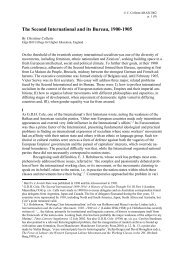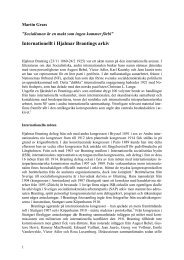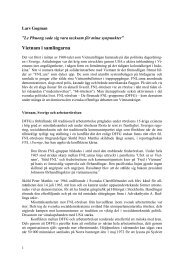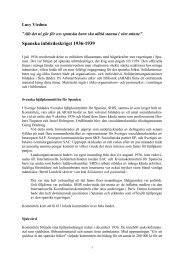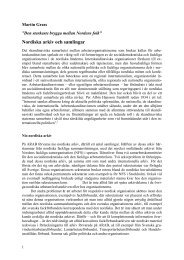Communism, Social Democracy and the Democracy Gap
Communism, Social Democracy and the Democracy Gap
Communism, Social Democracy and the Democracy Gap
You also want an ePaper? Increase the reach of your titles
YUMPU automatically turns print PDFs into web optimized ePapers that Google loves.
© S. Berger/ARAB 2002<br />
p. 4 (14)<br />
apparatus. Kautskyanism, Bernsteinan revisionism, Fabianism <strong>and</strong> most variants of<br />
continental Marxist thought were united in this belief in statism.<br />
<strong>Democracy</strong> was thus primarily a means to an end. As <strong>the</strong> Eisenach programme of<br />
<strong>the</strong> German SDAP put it in 1869, '… political freedom is <strong>the</strong> most indispensable<br />
precondition for <strong>the</strong> economic emancipation of <strong>the</strong> working classes. Hence <strong>the</strong> social<br />
question is indivisible from <strong>the</strong> political question. The solution to <strong>the</strong> former is conditional<br />
on <strong>the</strong> solution of <strong>the</strong> latter, <strong>and</strong> possible only in <strong>the</strong> democratic state.' 11 Political<br />
democracy was <strong>the</strong> means to achieve social equality. When Eduard Bernstein begged to<br />
differ <strong>and</strong> argued that 'in <strong>the</strong> last instance, for me, socialism means democracy, selfadministration',<br />
12 many in his own party declined to follow him. With Kautsky <strong>the</strong>y<br />
continued to believe that <strong>the</strong> existing class society made any true democracy impossible.<br />
Yet democratic institutions in <strong>the</strong> class state facilitated class conflict <strong>and</strong> thus heightened<br />
class consciousness. They paved <strong>the</strong> way to <strong>the</strong> proletarian revolution which, in<br />
democratic states such as Britain <strong>and</strong> Germany post-1918, would eventually come about<br />
by peaceful means, i.e. through <strong>the</strong> ballot box. Hence it is not surprising that Kautsky's<br />
'democratic Marxism' 13 was opposed to transferring <strong>the</strong> Bolshevik experiment to Western<br />
Europe. Given that Kautsky nowhere specifically analysed <strong>the</strong> exact nature of <strong>the</strong><br />
democratic transition from capitalism to socialism, his idea of democracy remained<br />
largely focussed on parliamentary representation <strong>and</strong> <strong>the</strong> championing of <strong>the</strong> rights of <strong>the</strong><br />
individual. It is generally noticeable that late nineteenth-century Marxist <strong>Social</strong><br />
Democracies paid little attention to minutiae of democracy <strong>and</strong> democratisation. After all,<br />
practically all of <strong>the</strong>m (to varying degrees) struggled ra<strong>the</strong>r with <strong>the</strong> absence of democratic<br />
structures. Hence <strong>the</strong>y sought to bring democratic institutions about ra<strong>the</strong>r than marvel<br />
about <strong>the</strong> intricate problems of democratic systems. 14<br />
Never<strong>the</strong>less, one could argue that Kautsky, Bernstein's main adversary in <strong>the</strong><br />
revisionism debate, ra<strong>the</strong>r ironically was as committed to liberal democratic thought as his<br />
ideological enemy. Both adhered to <strong>the</strong> belief that political democracy was <strong>the</strong> normative<br />
precondition for <strong>the</strong> development of a socialist society. Bernstein <strong>and</strong> Kautsky both<br />
championed <strong>the</strong> concept of representative democracy over that of direct democracy. 15 In<br />
that respect <strong>the</strong>y were following Kant <strong>and</strong> Mill ra<strong>the</strong>r than Rousseau, <strong>and</strong> both were<br />
influenced by <strong>the</strong> rights-based political language of British constitutional <strong>the</strong>ory. Yet<br />
Bernstein undoubtedly paid greater attention to <strong>the</strong> intricate problems of democratisation<br />
<strong>and</strong> linked democracy more firmly to socialism than most o<strong>the</strong>r contemporary Marxists<br />
including Kautsky.<br />
The European-wide debate on revisionism revealed <strong>the</strong> strong commitment of<br />
<strong>Social</strong> Democratic leaders in o<strong>the</strong>r Marxist parties to representative forms of democracy.<br />
MacDonald saw in Bernstein, who was a close personal friend, an intellectual mentor. 16<br />
Jean Jaurès, like Bernstein, was convinced that republicanism <strong>and</strong> democracy were<br />
eternally progressing to all fields of society. And he called on his fellow <strong>Social</strong> Democrats<br />
11 Dieter Dowe (ed.), Programmatische Dokumente der deutschen Sozialdemokratie (Berlin 1984, 2 nd edn),<br />
p. 174.<br />
12 Cited in Manfred B. Steger, The Quest for Evolutionary <strong>Social</strong>ism: Eduard Bernstein <strong>and</strong> <strong>Social</strong><br />
<strong>Democracy</strong> (Cambridge 1997), p. 140.<br />
13 Dick Geary, Karl Kautsky (Manchester 1987), p. 78.<br />
14 Anton Pelinka, <strong>Social</strong> Democratic Parties in Europe (New York 1983), p. 14.<br />
15 Kautsky was instrumental in defeating <strong>the</strong> German socialist apostle of direct democracy, Moritz<br />
Rittinghausen, whom he attacked vigorously after 1893. For Rittinghausen’s ideas on direct democracy see<br />
Moritz Rittinghausen, Die direkte Gesetzgebung durch das Volk, 4 th edn (Cologne 1877). For Kautsky’s<br />
rejection of Rittinghausen see Karl Kautsky, Der Parlamentarismus, die Volksgesetzgebung und die<br />
Sozialdemokratie (Stuttgart 1893).<br />
16 David Marqu<strong>and</strong>, Ramsay MacDonald (London 1977), pp. 56 f., 164.



